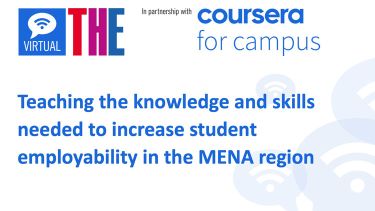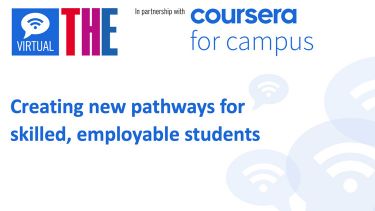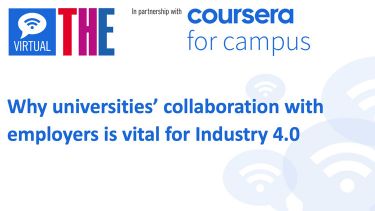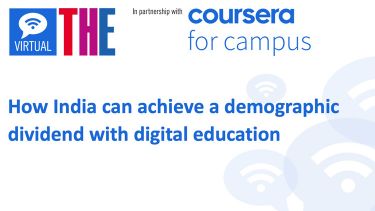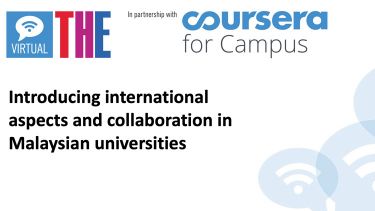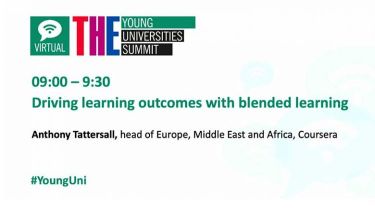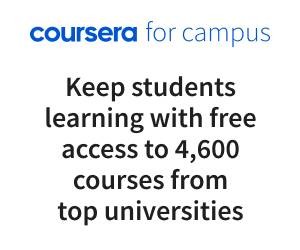
Institutions in Asia-Pacific are using the pandemic as an opportunity to strengthen ties across the region and better prepare students for employment
Forum held in October 2021.
The Asia-Pacific (APAC) region, like all corners of the globe, has faced unprecedented disruption from the Covid-19 pandemic. But APAC has some unique factors that make it well positioned to thrive in the pandemic’s aftermath. A youthful population, growing economies and renowned higher education institutions all bode well for the future.
During the Coursera APAC Unbounded Universities Forum, experts from across the region explored how its universities could use collaboration to succeed in a post-Covid world.
Making the most of Asia-Pacific's opportunities with skills education and industry collaboration
During the opening session of the forum, the panellists started their discussion by looking at how digital education could create more diverse curricula for different types of students in their respective countries. “All regions in Uzbekistan have benefited from the convenience of online education following the Covid-19 pandemic – particularly rural areas,” explained Farkhod Ibragimov, founder and CEO of IT Park Uzbekistan.
Although the pandemic may have hastened the implementation of digital skills, many institutions had been working in this area for some time. “The global 21st-century workforce is built around computing, communication and automation, so it's very important that you have access to digital education,” Joyce Teo, vice-president of global affairs at Universiti Brunei Darussalam, added. “The pandemic gave us an opportunity to improve on our curriculum and pedagogy so the interactive component for student learning was even more enriched.”
Carmen Lamagna, vice-chancellor of the American International University-Bangladesh, explained that digital education was enabling staff and students to communicate and learn in different ways. “Students have benefited because we have been able to invite speakers from all over the country or even from other parts of the world using digital platforms. It also encouraged teachers and students to partner with industry to develop curricula and new projects,” Lamagna said.
Coursera has been working throughout the APAC region to foster collaboration using digital technologies. “We have seen many students coming to the Coursera platform looking for digital skills like artificial intelligence, blockchain and Python,” Raghav Gupta, managing director for India and APAC at Coursera, commented. “Increasingly, universities are taking content directly from industry, which has been a significant catalyst for universities to open up their curricula.”
Watch the opening session of Coursera’s APAC Unbounded Universities Forum on demand above or on the THE Connect YouTube channel.
Find out more about the session.
Improving learning outcomes: new strategies to increase employability in APAC
Although Covid-19 has dominated discussions around higher education over the past 18 months, the sector is facing disruption that long predates the pandemic. By 2025, as many as 85 million jobs are set to be displaced as a result of digitisation and shifts in core skills. “The nature of work has completely changed, and that can be seen in all sectors, from retail to banking,” Eklavya Bhave, regional director for APAC and Japan at Coursera, said. “Increasingly, there is a mismatch between what is being taught on campus and what is being sought in the job market.”
Coursera works closely with businesses and has found that they are now focusing on emerging skills and not just degree qualifications. The skills needed to complete a project in the modern world of work are very different from those being taught in colleges and on campuses. “Universities continue to focus on their core curricula, but we are seeing emerging, digital or multidisciplinary skills becoming more important,” Bhave said. “When we talk to HR leaders of a company, it’s clear that if you are studying business, for example, it is also important that you have knowledge of AI or cloud computing.”
These views were echoed one panellist who championed the importance of teaching students interdisciplinary thinking: “Acquiring a lot of different skills and a lot of different knowledge is more important than having professors tell students what to learn and what to memorise for the purposes of taking tests.”
Unfortunately, teaching new digital skills comes with challenges. One panellist said their institution was working hard to “change the mindset of professors” who may not have the digital skills required for online teaching themselves.
As well as equipping students with the digital skills required by the modern world of work, Coursera also offers courses for faculty members who may need support with their own digital transformational journey. This is something that should not be neglected as the sector evolves.
Watch this session of Coursera’s APAC Unbounded Universities Forum on demand above or on the THE Connect YouTube channel.
Find out more about the session.
Improving learning outcomes: new strategies to increase employability in India
The higher education landscape is changing in several important ways. The first involves the implementation of blended learning, while the second concerns the growing prioritisation of student employability. The third and fourth factors, meanwhile, relate to affordability and supporting faculty development.
“As the world moves forward, we are working with universities on career training, creating credentials that are job-ready, and bringing in curriculum integration that allows for new modes of delivery,” Dulles Krishnan, managing director of enterprise for India and ANZ at Coursera, said. “It is possible to augment university curricula with job-ready content – provided either by other institutions or corporations – and delivered in a flipped classroom or through a digital learning platform.”
One panellist highlighted the importance of interdisciplinary knowledge: “At my institution, we embrace an interwoven learning model with eight main components that are very research-oriented. We even conduct assessment through a student’s research papers, and we place a lot of emphasis on communication.”
Krishnan spoke about the ways institutions can prepare their students for skills-first hiring. “We know that hiring companies have become more cost-conscious, so they are demanding skills rather than degrees. We have seen a lot of institutions partnering with companies like IBM, AWS and Google, but this can result in narrow outcomes. We want students to gain knowledge of a skill in a much broader context.”
“We also give internships to our students,” one panellist added. “In their first year, our students study core courses, so whatever skills they have learned they can put into practice at the end of the first year by involving themselves in a relevant internship.”
These practical skills are also encouraged by the Coursera platform, which provides added visibility around the kinds of skills that employers are looking for. “Students can see which skill sets are sponsored by which companies so they know that when they study a particular course, they will automatically appear on the radar of a potential employer,” Krishnan said. “The idea is for the platform to bring transparency and make industry collaboration a part of the academic course.”
Watch this session of Coursera’s APAC Unbounded Universities Forum on demand above or on the THE Connect YouTube channel.
Find out more about the session.
The future of international collaboration in Asia-Pacific’s higher education sector
During the closing session of the Coursera APAC Unbounded Universities Forum, the panellists sought to identify the unique strengths of Asia-Pacific and highlight how the region could cement itself as a global destination for excellence in teaching, learning and assessment.
One of the positive impacts of the Covid-19 pandemic is the way it has encouraged the adoption of new modes of international collaboration that do not rely on physical proximity. “There are many strengths of the Asia-Pacific region that can be leveraged in the new post-Covid world,” said Y. S. R. Murthy, vice-chancellor of RV University. “There are many countries growing on a fast trajectory as far as the economy is concerned; there is a large, youthful population that requires skilling; and there are regional mechanisms like ASEAN to foster collaboration between countries.”
Prahlad Rai Sodani, president of IIHMR University, said there was a great opportunity and scope for collaboration in the Asia-Pacific region. “IIHMR University works in a very specific sector and is engaged in a lot of research work and executive education. I’ve seen plenty of exchange of ideas among public health professionals working in these universities, and we also have a strong network across South-east Asian public health education institutions to further boost collaboration.”
Sampath Amaratunge, chair of the University Grants Commission, agreed that the increase in online collaboration had allowed institutions to foster stronger relationships with the rest of the world. “When it comes to education, I believe the spread of online methodology has greatly improved accessibility,” he said. “Collaboration can now happen with people all over the world.”
Raghav Gupta, managing director of India and APAC at Coursera, then spoke about the often-unheralded benefits of remote working, which allows companies to draw from a wider talent pool. “We are likely to see new, global job opportunities for students due to the rise of remote working. If I take just a very small example from Coursera, my team and I used to be located in three cities. Now we are in 24 cities. This broader geographical spread is certain to be beneficial for companies, universities and students.”
Watch the closing session of Coursera’s APAC Unbounded Universities Forum on demand above or on the THE Connect YouTube channel.
Find out more about the session.
Find out more about Coursera for Campus.
















